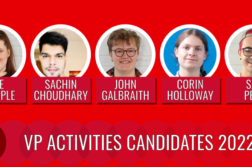Wessex Scene interviews Charlotte James, who is running for the role of VP Education and Democracy in the 2021 SUSU Leadership Elections.
Why have you decided to run for the role of VP Education and Democracy?
I am running for VP Education and Democracy because I want to ensure that every student has someone they can turn to in SUSU to represent them. I want to make sure that there is a representative that prioritises the student voice, regardless, gives students the ability to share their feedback, and actively improves the quality of education and SUSU. No student should have to deal with issues to do with their education or representation alone, and I will make sure all students feel confident and comfortable in raising awareness of these issues and work to resolve them as efficiently as possible.
What experience do you have that would make you an excellent fit for the role?
I have been very active in representing students over the last seven months. Before September, I created resources and FAQs for offer-holders and offered advice and guidance for new students, despite being a new student myself. I have been actively listening and acting on student feedback. From the halls refund petition to sending in official complaints regarding faculties, I am constantly trying to better the student experience. Especially for the 2020-intake, who have had a rough year having to transition to university life, balance living alone for the first time, online lessons that aren’t engaging, and a lack of social life.
Prior to joining the university, I worked at a college in my hometown as a Learning Technologist, which involved training teaching staff and students to use digital technology. I worked there for four years. During this time, I represented apprentices in the National Society of Apprentices, represented students at the National Union of Students conference, and actively tried to improve the experience of students at the college, despite it not being part of my job role. My favourite moments at the college were supporting students by offering tutoring, pushing for accessibility software (that worked), running the Students’ Union, and campaigning for sustainability and disability issues, as well as fundraising for young people’s mental health. As you may have guessed, that wasn’t my job description, but no-one else was doing it and therefore it became my priority.
What are the main problems you identify with the current role of VP Education and Democracy and how would you fix that?
No-one knows the role exists – still. No-one knows what the VP does, some even forget that democracy is part of the role! I think Avila is incredible and she has done so much to represent and support the student body, but no-one knows about it. These long-winded email newsletters and Facebook updates are boring and not where the students are. I get more feedback from things I’ve accomplished at the university in the unofficial Discord server and Crushampton II. We need to go where the students are.
The coronavirus pandemic has had a large impact on many students in many ways ranging from declining mental health to falling ill close to university deadlines. What will you do to ensure the fair and equal treatment of students who experience mitigating circumstances due to Covid-19?
I want to work closely with the VP Welfare and Community to ensure all students feel supported and represented. I don’t want any student to feel like their work isn’t the best it can be due to the fact they’re ill. I love the fact Avila pushed for special considerations to be automatically accepted with the mention of COVID-19, and I definitely want to push for leniency for deadlines. In the real world, if you miss a deadline, you get more time, providing you give a legitimate reason, which includes computer issues, internet connectivity issues, being ill, family emergencies, mental health issues, work going missing, and endless other reasons. We want to prepare students for the real-world but we’re not giving them an opportunity to explore how the real world works. Students don’t deserve to be blamed for the pandemic, much like the university doesn’t deserve to be blamed for the pandemic. When the university misses deadlines or doesn’t get things right, they have the opportunity to try again (e.g., from no rebates to rebates, issues in halls being resolved, improvements in the way courses are being taught online, etc.), so students should have the opportunity to try again.
In the past couple of years, interest in the Union Elections has steadily declined, and this year, the voting arrangements have changed in order to account for this decline. What will you do to help improve engagement in student politics?
Students don’t vote because they don’t feel represented or feel like their voices don’t mean anything. The second students start seeing changes for things they voted for or seeing things happening that they were promised, they will trust their representation again. They don’t care about the Union Elections, because why should they? If representatives aren’t listening, why should they talk? Why bother? It’s a lie to say that students don’t care about politics; they just don’t care about things that happen over and over again with no real change and where they stay silenced. So, if I am elected, I will give the students back their voice. I won’t restrict them to emailing me, or whatever the structure is, I don’t care how they contact me as long as they feel like they can. I will actively look for problems raised by students from unofficial sources, like the Discord server and Crushampton II, and I will work on them, whether people like it or not. I’m for the students. I don’t owe anyone else anything.
Many students have expressed concerns about a decline in education quality due to the coronavirus pandemic and the move to online learning. How do you propose to combat such issues?
Online learning has been given a really bad reputation thanks to the lack of organisation from the government and, therefore, the lack of training and support from most educational institutions. As I have mentioned, I literally did this for a living (when I wasn’t running off with the SU, of course). My small team of four had three days to train about two hundred teaching staff on using digital technology so they could continue to produce excellent quality teaching and learning using online tools. Fair enough, they had previous experience with it but it was still difficult. Does the university even have a digital team? If so, what are they doing? Why are lecturers still struggling? I have said it before and I will say it again – lecturers are problem-solvers. Some may feel like they aren’t understanding on purpose but trust me when I tell you they literally don’t have the time nor the energy to pretend to not understand how to use a tool to help students complete their degree.
In my manifesto, I state that I want to ensure life and digital skill workshops are available for students, but that doesn’t mean these are limited to just students. It would be incredible to offer more continuing professional development and digital skills workshops for teaching staff to get them to feel more confident about using the tools which inevitably affects and impacts the student population.
How will you support the academic interests of students who are typically sidelined, such as Joint Honours students, disabled students, and postgraduates?
By liaising with the Officers who look after these students and by constantly communicating with the student body to provide opportunities for all students to share their opinions and to feed back. I want to encourage as much communication as possible. I’d be more than happy to join groups, chats, or whatever it may be to have a presence and listen and act on complaints of these groups. For example, liaising with the Postgraduate Officer, the Disabilities Officer (I know Aimee has been great this year), and School Presidents to ensure all students get their say, including joint honours. By creating this channel of communication, I will make sure that every single student, regardless of their student status, gets the opportunity to be represented and their feedback to be heard and resolved.
If you were elected, what would be your top three areas of focus?
I want students to trust SUSU, I want a SUSU where students feel welcome to make a change and share their opinions without the fear of being ignored, and I want to make sure every faculty is delivering high-quality education to all students and their experience, within reason, is not hindered by the pandemic. So my main priorities are ensuring education is high quality, a reliable representative body that works for, and with, the students, and the best university experience students can possibly have.
One of your key points is to prioritise students’ mental health. How will you do this if elected as VP Education and Democracy?
I am currently going into detail of my manifesto over on my social media accounts and will be continuing to do so. I think mental health is a difficult one because everyone has different needs but that doesn’t mean that it’s not important. It’s critical. I know I personally do not perform well academically when I’m in my head and am experiencing periods of poor mental health, so it’s important that we have a system that values and understands that. I think actually listening to what students want is a really big thing. But the university team aren’t specialists, they’re unlikely to hire a specialist team because that’s what they have Unidocs for or the NHS (which I know has its own issues), but they can still listen and provide support when it comes to evaluating and assessing students. I could sit here and tell you what I want, which is what I’ve done on my social media, but what works for me might not work for the person reading this and therefore it is very difficult. I will put these things in place (buddy schemes, awareness of funds, support, resources), but I need to know how I can help the individual student and then work from there.
What do you think would be the benefits of the standardisation of Personal Academic Tutors?
So this, again, came from just listening to students. I mentioned my PAT on the Discord server and a lot of students commented they’d either never heard from theirs or didn’t even know who they were! I then noticed there were these polls and comments on Crushampton II about how some students (although, I could not share the year of the students) have also not had much from their PAT. It just frustrates me because before I came to uni, I heard how great, supportive, and fantastic they are to have but I don’t even think I know what they do. If students don’t have any communication with them, I feel like it would be beneficial for them to have access to and to understand the role of the PAT. A PAT can signpost to different services or departments when students are struggling with their education, mental health, funding, or whatever it may be. It would take a lot of stress off the student and the university, as students will know where they need to go rather than going down every single university website and email address – which, let’s face it when you’re low, that’s not what you want to be doing.



